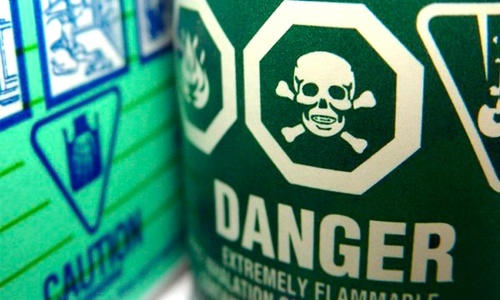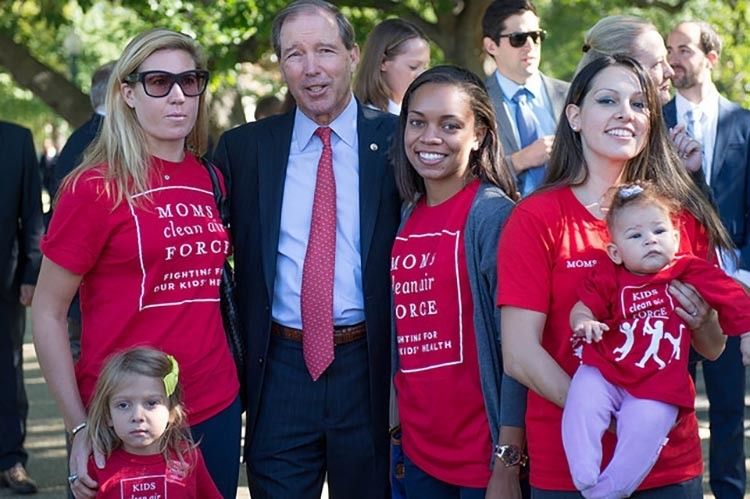
Battle Lines Are Drawn as Congress Reforms the 40-Year-Old Toxic Substances Control Act

Question of Authorship
While there is much to like to about the reform bills, particularly the protection they require for vulnerable segments of the population, they have drawn strong opposition. Safer Chemicals, Healthy Families, a 450-member coalition dedicated to TSCA reform that counts as its members a number of leading environmental and public health advocacy groups, such as the Natural Resources Defense Council, Earthjustice, Physicians for Social Responsibility, Planned Parenthood Federation of America and the Breast Cancer Fund, opposes the part of the reform bills that gives the EPA the ability to declare substances “low-priority” based on a finding that the chemical is “likely to meet” the safety standard, thereby leaving them off the official assessment table. That’s a loophole that, according Safer Chemicals, Healthy Families’ National Campaign Director Andy Igrejas, lets industry off the hook:
“A low-priority designation is a new form of pro-active non-assessment. It is effectively a hall pass for the chemical; a declaration that EPA will not review the chemical so it is therefore free to roam the economy and potentially your home without any restrictions. All on the back of ‘likely to.’ This distinction, which confers many of the benefits of being declared ‘safe’ but without a thorough safety evaluation, is likely to be coveted by chemical companies.”
Is it possible that the low-priority designation isn’t just coveted by chemical companies, but was actually written by them? Hearst Newspapers obtained a copy of the draft bill in the form of a Microsoft Word document, which has led to questions concerning the bill’s authorship. According to the San Francisco Chronicle, a Hearst paper, accessing the document’s “advanced properties” revealed that the company of origin was none other than the American Chemistry Council, the chemical industry’s powerful lobbying group. Ken Cook, president of the non-profit Environmental Working Group, was quick to denounce the legislative process behind chemicals reform. “We’re apparently at the point in the minds of some people in the Congress that laws intended to regulate polluters are now written by the polluters themselves,” he said.
Indeed, the chemical industry is so far supportive of the reform. “Updating the Toxic Substances Control Act is critical for our industry, one that creates the building blocks for 96 percent of all manufactured goods, playing a fundamental role in every facet of national commerce and the U.S. economy,” the American Chemistry Council said in a statement. According to the trade group, the Senate bill balances the needs of the public to be informed about chemicals in the marketplace without getting in the way of the industry’s job to make the kinds of chemicals—toxic though they might be—that manufacturers need.
Igrejas also notes that the Senate bill “weakens EPA’s ability to intercept imported products, like most of the toys under your Christmas tree, when they contain a known toxic chemical.” Following the March 2015 hearing by the Senate environment committee, he wrote, “The overwhelming conclusion to any but the most partisan observer was that the bill—though improved over last year’s version—needs additional work before it represents true progress for public health and gathers the broader support needed to become law.”
States Rights vs. Federal Oversight
But perhaps the most dramatic change that would be ushered in by the new legislation as it is currently written regards the role of states, which would have diminished control. The new law threatens to undo state-led efforts to protect citizens in light of failures at the federal level. “The toxics tug-of-war in state houses,” Ronnie Greene of the Center for Public Integrity said, “is direct fallout from the muddled environmental politicking of Washington, DC.” Notably, the new law would block states from taking direct action on potentially hazardous chemicals while the EPA makes its own assessments, which could delay rolling out necessary steps to protect public and environmental health, possibly for years.
In a letter to Sen. Barbara Boxer (D-CA), the ranking member of the Senate Committee on Environment and Public Works, California State Attorney General Kamala Harris said it “is deeply troubling given the enormous time lag certain to occur between the beginning of an EPA assessment and the effective date of any federal safety rule.” The federal time lag is truly extraordinary. In 2010, for example, the EPA added 16 new cancer-causing chemicals to the list of toxic substances that must be reported to the Toxics Release Inventory, which allows the American public to know what kinds of chemicals might be polluting their communities. It was the first time chemicals had been added to the list in over a decade.
Harris wasn’t the only state attorney general to come out against the Senate bill. A week after it was introduced, the state attorneys general of Iowa, Maine, Maryland, New York, Oregon and Washington sent a similar letter to Sen. Boxer and Sen. James Inhofe (R-OK), the environment committee chairman. They write:
“We oppose S. 697’s broadly expanded limitations on the ability of states to take appropriate action under state laws to protect against … risks posed by chemicals and chemical mixtures … In contrast to the existing law, S. 697 would prevent states from adopting new laws or regulations or taking other administrative action, ‘prohibiting or restricting the manufacture, processing, distribution in commerce or use’ of a chemical substance deemed by the U.S. Environmental Protection Agency to be a ‘high-priority’ for federal review even before any federal restrictions have been established. As a result, a void would be created where states would be prevented from acting to protect their citizens and the environment from those chemicals even though federal restrictions may not be in place for many years. S. 697 also eliminates two key provisions in the existing law that preserve state authority to protect against dangerous chemicals. One is the provision that provides for ‘co-enforcement’—allowing states to adopt and enforce state restrictions that are identical to federal restrictions in order to provide for additional enforcement of the law. The second is the provision that allows states to ban in-state use of dangerous chemicals.”
Last month, Sharon Lerner, who covers the environment for The Intercept, wrote an article focusing on the effect the TSCA reform bill would have on the work that is happening on the state level. “If the worst provisions from both bills wind up in the final law,” she writes, “the new legislation will gut laws that have put Oregon, California, Maine, Vermont, Minnesota and Washington state at the forefront of chemical regulation.”
Lerner told me that there are almost 20,000 chemicals currently on the marketplace whose identities remain unknown because they’re protected by law. “They’re considered confidential to business and you can’t check the safety of something if you don’t know the identity of it,” she said. Under the new legislation, she added, “none of that will change. I think it’s really important to remember that.”
But there is still time to make the final bill that reaches the president’s desk one that will please more of the stakeholders. But ultimately, legislators mustn’t lose sight of the bill’s basic goal: to protect people, wildlife and the environment from dangerous substances. “Luckily, it is not too late,” Igrejas said in a statement. “When Congress reconciles the House and Senate versions, they should focus on the fundamentals of reform and simply empower and direct EPA to identify and restrict toxic chemicals.” And they shouldn’t let corporate interests make the sausage.
Plastics and other toxic substances have arguably helped shape the modern world in many positive ways. But the rules governing their use and the way those rules have been written, are problematic, to say the least. As Dustin Hoffman remarked in The Graduate, “The rules don’t make any sense to me. They’re being made up by all the wrong people.”
YOU MIGHT ALSO LIKE
Cancer Survivor Climbs World’s Tallest Peaks, Helps Others Do the Same
FDA to Start Testing Monsanto’s Glyphosate in Food
French Ecology Minister Calls for Ban on Glyphosate Formulations
Interactive Map Shows Where Monsanto’s Roundup Is Sprayed in New York City

 233k
233k  41k
41k  Subscribe
Subscribe 
